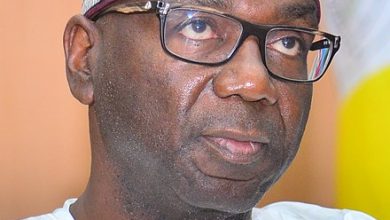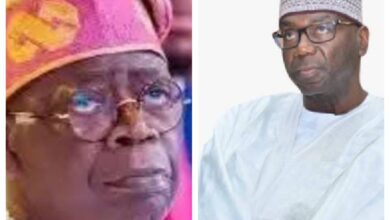Kwara Coalition: Of sore losers and negative fixation

By Abdulwahab Oba
It is probably fair and safe to conclude that of all that democracy and visionary leadership brought to bear in Kwara State in near seven years in the life of Dr Abdulfatah Ahmed’s administration in Kwara State, opposition and disgruntled parties and persons in the state, have comfortably settled in to its pitiable characterisation by Kwarans as camp of nose-bruised wailers and serial sore-losers, whose stock in trade is perpetuating propaganda, fallacies and turning truth head down for its deceptive, noise and drama value.
Indeed, nothing could well demonstrate this sad reality better than Tunde Mohammed’s quizzical hogwash titled: “Kwara and the coalition option”, in which he shamelessly alleged that “to majority of Kwarans, the last fifteen years have been years of tribulation”, without an emperical analysis or presentation of facts and figures.
For the avoidance of doubt, in the last decades of its existence, Kwara State has, no doubt, recorded appreciative progress and development, especially when juxtaposed with its disadvantaged resources. Such massive projects which include the establishment of Kwara Ethnix Designs (Kwara Furniture Company), Olam Nigeria cashew-nut processing facility, Dangote Flour Mills, TUYIL Pharmaceuticals Limited, the Chellarams motorcycle assembly plant and others bear testimonies to our positive story.
The state has also made significant strides in agriculture such that other states are adopting same agricultural methods and templates for agricultural development. In the education sector, Kwara State is one of the most educationally advanced states in the North. This is not only attributed to the fact that western education reached the state quite early, but also to the sustained programmes and policies of the state on education. The state houses a number of tertiary institutions – Universities, Polytechnics and Colleges of Education – which are either government or privately owned.
In the last fifteen years alone, Kwara State has not only established Kwara State University, Malete, but its campuses in other parts of the state while ensuring a steady development of the main campus.
But even more, the Gov. Saraki’s administration completed numerous rural water projects in about 60% of rural areas, representing about 480 communities. While this programme was the most extensive by any government at that time, it covered only about 50 percent of target rural dwellers. A water inventory taken by the government at the start of the programme showed that out of a total 67 waterworks for producing treated water from surface drains, about 75% had totally broken down while the remainder were functioning below installed capacity.
In the face of these challenges, however, the Gov Abdulfatah Ahmed’s government recorded some important progress through a two-phased programme – drilling of 57 new hand-pumped boreholes and installation of one solar-powered mini-motorised borehole. Today, the Ministry of Rural Development has delivered its promise of 10-borehole per ward/community under its Rural Water Scheme and Sanitation Agency (RUWASSA), amounting to a total of 1,930 boreholes in all the 193 wards/communities in the State.
The health system was not left out. First to receive attention under the Saraki administration was the vision 2020 programme, aimed at eradicating all causes of avoidable and preventable blindness among the inhabitants of the state. The state facilitated over 200 cataract-related surgeries, while over 700 eye glasses were given out to people free of charge and helped restore sight to people without which they would have gone totally blind. This was followed with the distribution of drugs worth N5 million to some hospitals while equipment worth N200 million were purchased and distributed to all the health institutions in the State.
Within the first one year in office, Governor Ahmed also hired fifty nurses, twenty-six medical doctors and eight Pharmacists. It is also on record that the last eight plus seven years was the emergence of an aggressive training programme for medical personnel in the ministry through series of training workshops for different categories of officers.
Though with the challenges of commercial agriculture in the country, the success story of Shonga Commercial Agriculture Project is no longer news.
Still about the people, in recognition of the significance of electricity in modern development, the then Gov Bukola made electrification a top priority. Hence, the aggressive electrification programme embarked upon was targeted at both rural and urban communities which saved about N1.5billion naira from both formal and informal sector on purchase of diesel and fuel.
Not done yet. In line with the Shared Prosperity Agenda of Dr Ahmed’s administration, especially in the roads and transport sector, majority of inherited roads from previous administration were completed. As of 2015, about 28 inherited projects covering a length of 2256.127 kilometers were targeted under this scheme with eighty percent of these roads covering 204.8 km completed. These include Akerebiata-Zango Road, Ilorin, Ganmo-Afon Road, Omu-Aran to Landmark University road and Chikanda-Kosubosu Road (sections 1 and 2); the Oloro Palace road, Offa-Irra Road, Sango-Oke Andi Road, Babanloma Township Road and Rehabilitation of Kaiama General Hospital Road etc.
As of December 2017, ongoing roads in the state include Share-Oke Ode Road, Kaiama-Teshe Road, Anilelerin Agun-Ita Erin Road, Offa, Maigida-Arobadi Road, Offa-Ipe Road, Egbejila-Asa Dam Road, Ilorin, Dualization of Kulende –UITH-Oke Ose Road, Geri Alimi Split Diamond Interchange (Phase I), Ilesha Baruba Gwanara road, Henry George-Mini Campus Road etc. The state government also intervened on some federal roads to ease the economic activities of the state by fixing the Patigi-Kpada-Rogun Road, Dualisation of Offa Garage – Dangote Road (South link road); Ilorin, Fate Road to Gss Roundabout and Kaiama-Kishi road, among others. These are but few of achievements of the last fifteen years. We have, of course, not mentioned the Harmony Diagnostic Centre, the International Aviation College, the fledging International Vocational Training Centre and the on going Diamond Underpass.
Indeed, while everyone, including Tunde, has the right to hold any opinion, good or bad, about the government of Kwara State, one expects that anyone doing so should respect the sanctity of truth. It is mischief not to recognise that in the first year of operation in 2016, Kwara Internal Revenue Service generated N17.4 billion. KWIRS has forever positively changed the course of our history.
Dissecting the piece riddled with rabid, smokey and fallacious makeovers, without power of clairvoyance, it was possible to understand and sympathise with Tunde as he gleefully poked the truth. But the people’s power spoke, rejecting, inflicting and viciously damaging their pride at the polls. It was a damaging defeat that even time and tide seemed hopeless about healing. It was so bad that everyone began looking for a scapegoat, real and imagined enemies. Chief, as always, has been the peace-loving people of the state, who made their choice at the ballot box.
There is no doubt that both Governors Saraki and Ahmed’s have recorded appreciable progress and left indelible marks on the footprint of time in the administration of Kwara State, working in consonance with the vision of the founding fathers of the state and passionately deepening developmental foundations. But because for the likes of Tunde, opposition means never always seeing anything good, and so much like a well-practised old art – dreaming evil, believing evil, expecting evil and trusting evil – it has been a tradition of sustainably recycling lies and hoping that one day soon, it would become truth. What manner of people are they?




